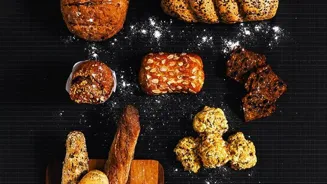Unraveling the Mystery of Taste: Dive into the Science of Flavors and Preferences! Read More for a Flavorful Journey
We all know that feeling. That "mmm" after a delicious bite of your favourite idli sambar,
or the slight grimace when trying a bitter karela sabzi. But have you ever wondered what exactly is happening in your mouth and brain that makes you experience these different tastes?

It's not magic, but science, pure and simple! The 'science of taste' is a fascinating field that explores how we perceive flavors and why we have such varied preferences. It's a complex interplay of biology, chemistry, and even psychology which gives you a complete sensory experience.
The taste we experience is not just what our tongue feels but it is a combination of the senses. This makes you want to indulge more in some food than others. Let us dive into the yummy world of taste.
Flavor perception involves taste, smell, texture, and appearance
Taste isn't simply about the tongue. While our tongue does play a vital role, with its taste buds that detect sweet, sour, salty, bitter, and umami (a savory, meaty taste), it's just the beginning. The experience of flavour is a multi-sensory one. Smell is a huge contributor.
Think about how food tastes when you have a cold and your nose is blocked. Suddenly, everything is bland! This is because much of what we perceive as "taste" is actually aroma reaching receptors in our nose through the back of our throat.
Then there's texture that adds to the experience, that is, how food feels in our mouth — creamy, crunchy, smooth. Appearance plays a role, too! A colourful dish is often more appealing. Some research suggests that even our expectations can influence taste.
For example, if we're told a dish is prepared by a famous chef, we might perceive it more positively, even if it's the same one made by someone else.
Taste preferences evolve over time due to experiences, exposure, genetics, culture, and traditions
Our taste preferences are not set in stone. They develop over time, with our experiences shaping what we like and dislike. Think about the foods you enjoyed as a child. You may have hated broccoli back then, but now you enjoy it roasted with garlic and a sprinkle of lemon.
Exposure plays a significant role. The more often you eat a particular food, the more likely you are to develop a liking for it. This is why cultures have different cuisines and food preferences are based on what ingredients are locally available and traditionally consumed.
Genetics can also play a role in taste preferences. Some people are more sensitive to bitter tastes than others, due to difference in their genes, which means certain vegetables might be less appealing to them.
Culture, family traditions, and personal experiences form who we are and influence our food choices, too.
Taste influences food choices, impacting health and diet balance
There are some interesting connections between taste and health. Taste can influence our food choices and, therefore, our overall health. A craving for sweet foods, for instance, can lead to overconsumption of sugar, which can contribute to weight gain and other health problems.
Understanding the science of taste can help us make healthier choices. By learning to appreciate a wider range of flavours, including those in healthy foods like fruits, vegetables, and whole grains, we can create a more balanced diet.
It’s important to have a varied diet that is rich in all the important nutrients that are needed for a healthy lifestyle. Taste is not just about what we enjoy; it will help us in maintaining a healthy lifestyle.
The food industry prioritizes taste science for better consumer experience and reduced food waste
The food industry is very interested in the science of taste. Restaurants and food companies spend a lot of time figuring out how to make their foods as delicious and appealing as possible. This involves careful consideration of flavour pairings, textures, and aromas.
Some companies even use techniques which is known as "sensory evaluation" to test how consumers perceive different products and identify ways to optimize their formulas by modifying the ingredients. Understanding the science of taste also has implications for food waste.
By making tasty and delicious foods, these businesses hope to provide the best experience to their customers. This is why the restaurants should conduct regular tests to analyze their recipes and improve the taste.
Food is more than fuel; it's cultural, enjoyable, and healthful
So, the next time you enjoy a delicious meal, take a moment to appreciate the complex science behind it. It's a reminder that food is not just fuel for our bodies but also a source of enjoyment, cultural connection, and even health.
Exploring the science behind taste can enrich your appreciation of food, and hopefully encourage you to try new things and create a diverse and healthy experience.
It is not as easy to define all the underlying mechanisms and science behind any food/dish, so there are a lot of things yet to be explored. But what we already know is that food is important for our body and we should eat to live and not live to eat.
AI Generated Content. Glance/InMobi shall have no liability for the content
















